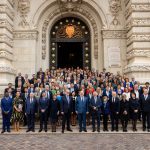Seychelles with the support and funding of the Indian Ocean Rim Association (IORA) is championing the development of a Sustainable Ocean Management (SOM) education programme to engage learners to become ocean literate and develop the Blue Economy (BE) sector. The Project known as ‘A study incorporating sustainable ocean management into the Science curriculum for 12-13 years old’ includes a review of the current Science Programme of Study for secondary 1 students only, and the development of resources on sustainable ocean management to be used by teachers and students in the classroom. Two consultants have been contracted by the Department of Blue Economy for the project, namely Mr. Shane Emilie on behalf of Promel Consulting as the Curriculum Designer, and Ms. Sylvanna Antat as the Ocean Educator. The project is for a period of one year and will be completed in two phases, commencing September 2022 and ending September 2023.
As part of the curriculum design component, an inception workshop was organised by Promel Consulting on Wednesday 26th October 2022 involving curriculum and ocean governance experts as well as Geography and Science teachers from secondary schools. The primary objective of the workshop was to achieve consensus on the current gaps and areas for improvement in the Science Programme of study for secondary 1 students to feature sustainable ocean management through the consultative forum. Teachers were able to review and comment on the findings presented by the consultant.
Based on the findings presented and verified at the workshop, no more than 17% of the objectives are linked to sustainable ocean management and there is a need to improve the science programme of study for secondary 1 to feature such an important concept and its objectives. At present, only topics such as the water cycle, living things and interdependence refer to sustainable ocean management. Considering the relationship between the learning areas of Science and Geography, a summary of the objectives from the geography programme of study that also links to sustainable ocean management was presented at the workshop. In what is commonly referred to as curriculum integration, combining Geography and Science in the analysis helped to shed light on the links between both subjects.
Research has shown that Geography in the formal education system contributes to the development of science literacy, which implies that certain topics taught in the learning area, will also complement what is taught in science. Approximately 20% of the objectives within the geography programme of study for secondary 1 students are linked to the sustainable ocean management concept. Some topics identified are climate change, population studies and tourism.
Besides the consultative discussions which took place during the workshop, the participants were also able to learn more about sustainable ocean management. A working definition and the proposed principles of sustainable ocean management were presented to the workshop participants. Mr Emilie explained that developing a conceptual framework for sustainable ocean management has proven to be useful because it helped with the gap analysis and will also be used when implementing other project activities. In due course, Promel Consulting will be conducting more consultative meetings with educators and key experts on the subject to map out the essential topics and corresponding objectives that should be included in the science programme of study.
For several years, Seychelles has been championing the Blue Economy concept. Given our status as an ocean nation, there have been previous discussions on the need to incorporate such an important concept and its objectives within the Seychelles curriculum and programme of study. On this note, it is imperative that our younger generation becomes ocean literate, for them to develop a better understanding of our influence on the ocean and the ocean’s influence on us. Education for Sustainable Development can help towards this end since it provides a framework to incorporate sustainable ocean management concepts and objectives in the formal education system, hence integrating critical issues such as climate change, sustainable consumption, and ocean degradation and overfishing.
To conclude, it can be said that this project will yield the desired result for a particular key stage of the formal education system, however, this should also be considered with utmost priority for other levels as well. Therefore, more funding is required to ensure project continuity by embarking on a similar exercise to benefit other key stages. This will generate the right outcomes in line with Sustainable Development Goals 14 and 4 (Life Below Water and Quality Education respectively) for our younger generation to be empowered to become ocean-literate individuals, who are better equipped to make informed decisions and take responsible actions that promote ocean sustainability.

Ministry of Fisheries and Blue Economy
2nd Floor Maison Collet
Palm Street, Victoria, Mahé
P.O Box 408
Republic of Seychelles
+248 4672300
info@mofbe.gov.sc
